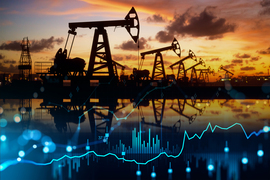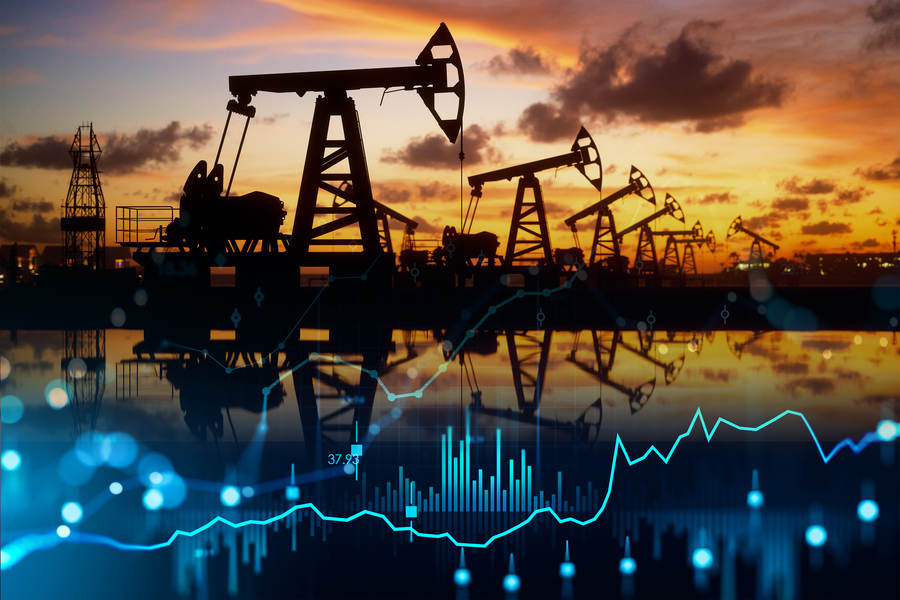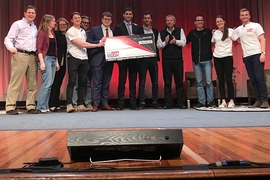There is a staggeringly long list of things that can go wrong during the complex operation of an oil field.
One of the most common problems is spills of the salty brine that’s a toxic byproduct of pumping oil. Another is over- or under-pumping that can lead to machine failure and methane leaks. (The oil and gas industry is the largest industrial emitter of methane in the U.S.) Then there are extreme weather events, which range from winter frosts to blazing heat, that can put equipment out of commission for months. One of the wildest problems Sebastien Mannai SM ’14, PhD ’18 has encountered are hogs that pop open oil tanks with their snouts to enjoy on-demand oil baths.
Mannai helps oil field owners detect and respond to these problems while optimizing the operation of their machinery to prevent the issues from occurring in the first place. He is the founder and CEO of Amplified Industries, a company selling oil field monitoring and control tools that help make the industry more efficient and sustainable.
Amplified Industries’ sensors and analytics give oil well operators real-time alerts when things go wrong, allowing them to respond to issues before they become disasters.
“We’re able to find 99 percent of the issues affecting these machines, from mechanical failures to human errors, including issues happening thousands of feet underground,” Mannai explains. “With our AI solution, operators can put the wells on autopilot, and the system automatically adjusts or shuts the well down as soon as there’s an issue.”
Amplified currently works with private companies in states spanning from Texas to Wyoming, that own and operate as many as 3,000 wells. Such companies make up the majority of oil well operators in the U.S. and operate both new and older, more failure-prone equipment that has been in the field for decades.
Such operators also have a harder time responding to environmental regulations like the Environmental Protection Agency’s new methane guidelines, which seek to dramatically reduce emissions of the potent greenhouse gas in the industry over the next few years.
“These operators don’t want to be releasing methane,” Mannai explains. “Additionally, when gas gets into the pumping equipment, it leads to premature failures. We can detect gas and slow the pump down to prevent it. It’s the best of both worlds: The operators benefit because their machines are working better, saving them money while also giving them a smaller environmental footprint with fewer spills and methane leaks.”
Leveraging “every MIT resource I possibly could”
Mannai learned about the cutting-edge technology used in the space and aviation industries as he pursued his master’s degree at the Gas Turbine Laboratory in MIT’s Department of Aeronautics and Astronautics. Then, during his PhD at MIT, he worked with an oil services company and discovered the oil and gas industry was still relying on decades-old technologies and equipment.
“When I first traveled to the field, I could not believe how old-school the actual operations were,” says Mannai, who has previously worked in rocket engine and turbine factories. “A lot of oil wells have to be adjusted by feel and rules of thumb. The operators have been let down by industrial automation and data companies.”
Monitoring oil wells for problems typically requires someone in a pickup truck to drive hundreds of miles between wells looking for obvious issues, Mannai says. The sensors that are deployed are expensive and difficult to replace. Over time, they’re also often damaged in the field to the point of being unusable, forcing technicians to make educated guesses about the status of each well.
“We often see that equipment unplugged or programmed incorrectly because it is incredibly over-complicated and ill-designed for the reality of the field,” Mannai says. “Workers on the ground often have to rip it out and bypass the control system to pump by hand. That’s how you end up with so many spills and wells pumping at suboptimal levels.”
To build a better oil field monitoring system, Mannai received support from the MIT Sandbox Innovation Fund and the Venture Mentoring Service (VMS). He also participated in the delta V summer accelerator at the Martin Trust Center for MIT Entrepreneurship, the fuse program during IAP, and the MIT I-Corps program, and took a number of classes at the MIT Sloan School of Management. In 2019, Amplified Industries — which operated under the name Acoustic Wells until recently — won the MIT $100K Entrepreneurship competition.
“My approach was to sign up to every possible entrepreneurship related program and to leverage every MIT resource I possibly could,” Mannai says. “MIT was amazing for us.”
Mannai officially launched the company after his postdoc at MIT, and Amplified raised its first round of funding in early 2020. That year, Amplified’s small team moved into the Greentown Labs startup incubator in Somerville.
Mannai says building the company’s battery-powered, low-cost sensors was a huge challenge. The sensors run machine-learning inference models and their batteries last for 10 years. They also had to be able to handle extreme conditions, from the scorching hot New Mexico desert to the swamps of Louisiana and the freezing cold winters in North Dakota.
“We build very rugged, resilient hardware; it’s a must in those environments” Mannai says. “But it’s also very simple to deploy, so if a device does break, it’s like changing a lightbulb: We ship them a new one and it takes them a couple of minutes to swap it out.”
Customers equip each well with four or five of Amplified’s sensors, which attach to the well’s cables and pipes to measure variables like tension, pressure, and amps. Vast amounts of data are then sent to Amplified’s cloud and processed by their analytics engine. Signal processing methods and AI models are used to diagnose problems and control the equipment in real-time, while generating notifications for the operators when something goes wrong. Operators can then remotely adjust the well or shut it down.
“That’s where AI is important, because if you just record everything and put it in a giant dashboard, you create way more work for people,” Mannai says. “The critical part is the ability to process and understand this newly recorded data and make it readily usable in the real world.”
Amplified’s dashboard is customized for different people in the company, so field technicians can quickly respond to problems and managers or owners can get a high-level view of how everything is running.
Mannai says often when Amplified’s sensors are installed, they’ll immediately start detecting problems that were unknown to engineers and technicians in the field. To date, Amplified has prevented hundreds of thousands of gallons worth of brine water spills, which are particularly damaging to surrounding vegetation because of their high salt and sulfur content.
Preventing those spills is only part of Amplified’s positive environmental impact; the company is now turning its attention toward the detection of methane leaks.
Helping a changing industry
The EPA’s proposed new Waste Emissions Charge for oil and gas companies would start at $900 per metric ton of reported methane emissions in 2024 and increase to $1,500 per metric ton in 2026 and beyond.
Mannai says Amplified is well-positioned to help companies comply with the new rules. Its equipment has already showed it can detect various kinds of leaks across the field, purely based on analytics of existing data.
“Detecting methane leaks typically requires someone to walk around every valve and piece of piping with a thermal camera or sniffer, but these operators often have thousands of valves and hundreds of miles of pipes,” Mannai says. “What we see in the field is that a lot of times people don’t know where the pipes are because oil wells change owners so frequently, or they will miss an intermittent leak.”
Ultimately Mannai believes a strong data backend and modernized sensing equipment will become the backbone of the industry, and is a necessary prerequisite to both improving efficiency and cleaning up the industry.
“We’re selling a service that ensures your equipment is working optimally all the time,” Mannai says. “That means a lot fewer fines from the EPA, but it also means better-performing equipment. There’s a mindset change happening across the industry, and we’re helping make that transition as easy and affordable as possible.”










